9 start with Y start with Y
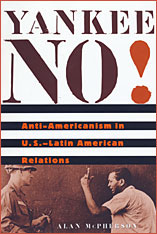
In 1958, angry Venezuelans attacked Vice President Richard Nixon in Caracas, opening a turbulent decade in Latin American–U.S. relations. In Yankee No! Alan McPherson sheds much-needed light on the controversial and pressing problem of anti-U.S. sentiment in the world.
Examining the roots of anti-Americanism in Latin America, McPherson focuses on three major crises: the Cuban Revolution, the 1964 Panama riots, and U.S. intervention in the Dominican Republic. Deftly combining cultural and political analysis, he demonstrates the shifting and complex nature of anti-Americanism in each country and the love–hate ambivalence of most Latin Americans toward the United States. When rising panic over “Yankee hating” led Washington to try to contain foreign hostility, the government displayed a surprisingly coherent and consistent response, maintaining an ideological self-confidence that has outlasted a Latin American diplomacy torn between resentment and admiration of the United States.
However, McPherson warns, U.S. leaders run a great risk if they continue to ignore the deeper causes of anti-Americanism. Written with dramatic flair, Yankee No! is a timely, compelling, and carefully researched contribution to international history.
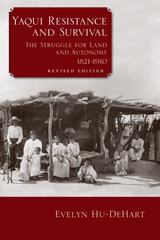
In this revised edition of her groundbreaking work, Hu-DeHart reviews and reflects on the growth in scholarship about the Yaqui, including advances in theoretical frameworks and methodologies on borderlands, transnationalism, diaspora, and collective memory that are especially relevant to their history.
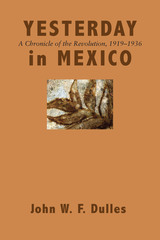
Early in a sixteen-year sojourn in Mexico as an engineer for an American mining company, John W. F. Dulles became fascinated by the story of Mexico’s emergence as a modern nation, and was imbued with the urge to tell that story as it had not yet been told—by letting events speak for themselves, without any interpretations or appraisal.
The resultant book offers an interesting paradox: it is “chronicle” in the medieval sense—a straightforward record of events in chronological order, recounted with no effort at evaluation or interpretation; yet in one aspect it is a highly personal narrative, since much of its significant new material came to Dulles as a result of personal interviews with principals of the Revolution. From them he obtained firsthand versions of events and other reminiscences, and he has distilled these accounts into a work of history characterized by thorough research and objective narration.
These fascinating interviews were no more important, however, than were the author’s many hours of laborious search in libraries for accounts of the events from Carranza’s last year to Calles’ final retirement from the Mexican scene. The author read scores of impassioned versions of what transpired during these fateful years, accounts written from every point of view, virtually all of them unpublished in English and many of them documents which had never been published in any language.
Combining this material with the personal reminiscences, Dulles has provided a narrative rich in its new detail, dispassionate in its presentation of facts, dramatic in its description of the clash of armies and the turbulence of rough-and-tumble politics, and absorbing in its panoramic view of a people’s struggle.
In it come to life the colorful men of the Revolution —Obregón, De la Huerta, Carranza, Villa, Pani, Carillo Puerto, Morones, Calles, Portes Gil, Vasconcelos, Ortiz Rubio, Garrido Canabal, Rodríguez, Cárdenas. (Dulles’ narrative of their public actions is illumined occasionally by humorous anecdotes and by intimate glimpses.) From it emerges also, as the main character, Mexico herself, struggling for self-discipline, for economic stability, for justice among her citizens, for international recognition, for democracy.
This account will be prized for its encyclopedic collection of facts and for its important clarification of many notable events, among them the assassination of Carranza, the De La Huerta revolt, the assassination of Obregón, the trial of Toral, the resignation of President Ortiz Rubio, and the break between Cárdenas and Calles. More than sixty photographs supplement the text.
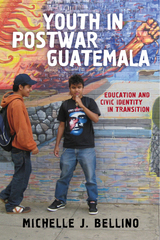
In the aftermath of armed conflict, how do new generations of young people learn about peace, justice, and democracy? Michelle J. Bellino describes how, following Guatemala’s civil war, adolescents at four schools in urban and rural communities learn about their country’s history of authoritarianism and develop civic identities within a fragile postwar democracy.
Through rich ethnographic accounts, Youth in Postwar Guatemala, traces youth experiences in schools, homes, and communities, to examine how knowledge and attitudes toward historical injustice traverse public and private spaces, as well as generations. Bellino documents the ways that young people critically examine injustice while shaping an evolving sense of themselves as civic actors. In a country still marked by the legacies of war and division, young people navigate between the perilous work of critiquing the flawed democracy they inherited, and safely waiting for the one they were promised...
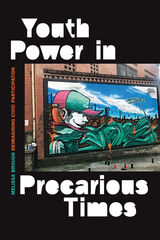
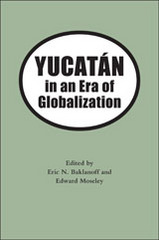
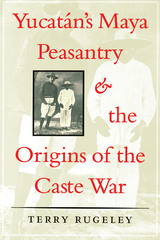
Conflicts between native Maya peoples and European-derived governments have punctuated Mexican history from the Conquest in the sixteenth century to the current Zapatista uprising in Chiapas. In this deeply researched study, Terry Rugeley delves into the 1800-1847 origins of the Caste War, the largest and most successful of these peasant rebellions.
Rugeley refutes earlier studies that seek to explain the Caste War in terms of a single issue. Instead, he explores the interactions of several major social forces, including the church, the hacienda, and peasant villagers. He uncovers a complex web of issues that led to the outbreak of war, including the loss of communal lands, substandard living conditions, the counterpoise of Catholicism versus traditional Maya beliefs, and an increasingly heavy tax burden.
Drawn from a wealth of primary documents, this book represents the first real attempt to reconstruct the history of the pre-Caste War period. In addition to its obvious importance for Mexican history, it will be illuminating background reading for everyone seeking to understand the ongoing conflict in Chiapas.
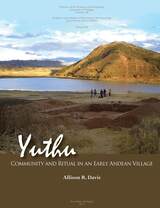
The crown jewel of the Inka Empire was their capital, Cusco. So celebrated was the Cusco of Inka times that we sometimes forget how little we know of earlier times in the region. This book presents Allison Davis’ pioneering excavations at the high-altitude Formative site of Yuthu. Davis presents all her data on early households and evidence for the villagers’ subsistence strategies, craft production, and mortuary practices. From her excavations we learn a great deal about daily life and public rituals, each conducted in a different sector of Yuthu. An unexpected bonus of Davis’ excavations was the discovery that some well-known Inka practices actually had their origin in the early villages of the Cusco region. Before her work at Yuthu, so few early houses and ceremonial structures had been published in detail for the Cusco area that we had much less evidence for understanding sacred versus secular space. Davis’ excavations contribute to our understanding of one of the most important transitions in Andean history: the shift from autonomous egalitarian villages to multicommunity polities with hereditary inequality. She is able to link archaeological houses, sites, and multisite clusters to socially meaningful units such as families, villages, and communities. Davis is also able to combine her excavations with settlement pattern data to develop a regional picture of the Formative period in Cusco. This volume is not only the first excavation report on a Formative village in the Cusco area, but is also a study that contributes new data on many traditional Andean themes, including zonal complementarity, sacred landscapes, community composition, mummies and ancestor veneration, ritual canals and religious rites, and intra-village subdivisions.
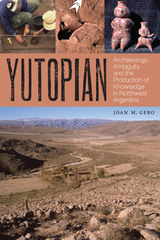
Around 400 BCE, inhabitants of the Southern Andes took up a sedentary lifestyle that included the practice of agriculture. Settlements were generally solitary or clustered structures with walled agricultural fields and animal corrals, and the first small villages appeared in some regions. Surprisingly, people were also producing and circulating exotic goods: polychrome ceramics, copper and gold ornaments, bronze bracelets and bells. To investigate the apparent contradiction between a lack of social complexity and the broad circulation of elaborated goods, archaeologist Joan Gero co-directed a binational project to excavate the site of Yutopian, an unusually well-preserved Early Formative village in the mountains of Northwest Argentina.
In Yutopian, Gero describes how archaeologists from the United States and Argentina worked with local residents to uncover the lifeways of the earliest sedentary people of the region. Gero foregounds many experiential aspects of archaeological fieldwork that are usually omitted in the archaeological literature: the tedious labor and constraints of time and personnel, the emotional landscape, the intimate ethnographic settings and Andean people, the socio-politics, the difficult decisions and, especially, the role that ambiguity plays in determining archaeological meanings. Gero’s unique approach offers a new model for the site report as she masterfully demonstrates how the decisions made in conducting any scientific undertaking play a fundamental role in shaping the knowledge produced in that project.
READERS
Browse our collection.
PUBLISHERS
See BiblioVault's publisher services.
STUDENT SERVICES
Files for college accessibility offices.
UChicago Accessibility Resources
home | accessibility | search | about | contact us
BiblioVault ® 2001 - 2024
The University of Chicago Press









